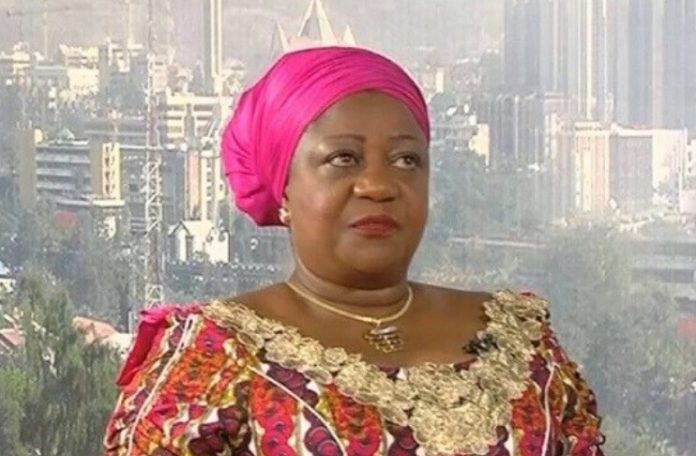Editorial
Withdraw Onochie’s Nomination Now

In what appears to be a deliberate assault on the sensibility of Nigerians, President
Muhammadu Buhari recently nominated a card-carrying member of the ruling All Progressives Congress (APC), Ms Lauretta Onochie, into the Independent National Electoral Commission (INEC) as a National Commissioner.
Coming at a time when the torrents of protests against the notorious anti-robbery unit of the Nigerian Police Force known as the Special Anti-Robbery Squad (SARS) have reached a feverish pitch, the appointment of Onochie is, to say the least, very insensitive and ill-advised.
No fewer than 70 civil society organisations (CSO), some opposition parties, Senior Advocates of Nigeria and other interest groups have vehemently criticised the appointment.
It is unimaginable and paradoxical too, that the President who, not too long ago, enjoyed the goodwill of the Nigerian populace over the conduct of the Edo State governorship election and the dismantling of the vicious, infamous anti-robbery squad would make a turnabout to commit such a political heresy.
Recall that President Buhari was commended for his non-partisanship in the Edo State governorship election held on September 19. He was also recently hailed for dismantling the notorious arm of the Nigerian Police that was terrorising Nigerians.
His recent appointment of Onochie, a well-known member of APC in Delta State into INEC has, however, eroded this goodwill going by the avalanche of criticisms that is currently trailing this infamous action.
Like many other Nigerians, The Tide considers Onochie’s nomination as an assault on the Nigerian Constitution and in particular, a gross violation of Item F, Paragraph 14 of the Third Schedule of the 1999 Constitution (as amended), which forbids a card carrying member of a political party to be a member of INEC.
By this constitutional provision, the appointment of Onochie is an insult to the institution of INEC and a direct affront on the patience and emotions of Nigerians who have tolerated the excesses of the Buhari government in the last five years.
Besides being a card carrying member of Buhari’s political party, Onochie is the Senior Special Assistant to the President on Social Media. Her nomination into such a sensitive position will surely compromise the neutrality of the electoral body. As a political officeholder and an ally of a political party, Onochie should ordinarily not be allowed to hold any office in INEC.
We say this because the position of INEC commissioner requires some elements of maturity, neutrality and non-partisanship. Onochie doesn’t have these credentials to serve as an impartial arbiter in INEC.
Like the Rivers State Governor, Chief Nyesom Wike, recently noted, the appointment of Onochie is a recipe for election rigging ahead of the 2023 elections. Her appointment will not only constitute an impediment to the independence and sanctity of the electoral umpire, it will also erode the recent gains recorded by INEC and undermine the entire democratic process.
At a time when Nigerians’ confidence in INEC and the nation’s electoral system is beginning to shore up, it will be suicidal to erode the people’s trust on the platter of vested interest. In other words, Onochie’s appointment does not sit well with the Nigerian Constitution and the recent gains of the nation’s electoral system and should, therefore, be withdrawn forthwith.
This appointment is least expected from a President who has always professed his support for the independence of INEC. As a President who is serving his second and final tenure in office, it would have been more honourable and dignified for Buhari to bequeath to the country a viable, non-corrupt and truly independent electoral body.
We insist that the mood of the nation at this period of #EndSARS protests does not call for such erratic nomination by the President. This period calls for sober reflection and a lot of proper reasoning on the part of our leaders. Anything short of this will be very insensitive to the feelings of the generality of Nigerians and may further challenge the already angry populace to action.
Again, we urge President Buhari to withdraw, without delay, Onochie’s nomination that is currently before the Senate. If, however, the President finds Onochie’s services too indispensable to him, he may find another job for his beloved aide. But her service is surely not needed in INEC.
However, if the President refuses to yield to popular demand, the members of the Senate, irrespective of their political leanings, should rise up to the occasion to reject Onochie’s nomination and save the nation the ugly backlash of this thoughtless appointment.
Editorial
Beginning A New Dawn At RSNC

Editorial
Sustaining OBALGA’s Ban On Street Trading

Editorial
AFCON ’25: Bravo, Super Eagles, But…

-

 Sports3 days ago
Sports3 days ago2026 WC: Nigeria, DR Congo Awaits FIFA Verdict Today
-

 Environment3 days ago
Environment3 days agoOxfam, partners celebrate 5 years of climate governance programmes in Nigeria
-
Politics3 days ago
ADC, PDP, LP Missing As INEC Set For By- Elections In Rivers
-
Politics3 days ago
FG’s Economic Policies Not Working – APC Chieftain
-

 Politics3 days ago
Politics3 days ago2027: Diri Unveils RHA LG Coordinators, APC Congress Panel
-

 Politics3 days ago
Politics3 days agoReps To Meet,’Morrow Over INEC’s 2027 Election Timetable
-

 Politics3 days ago
Politics3 days agoGroup Continues Push For Real Time Election Results Transmission
-
Sports3 days ago
Sunderland Overcome Oxford Challenge

